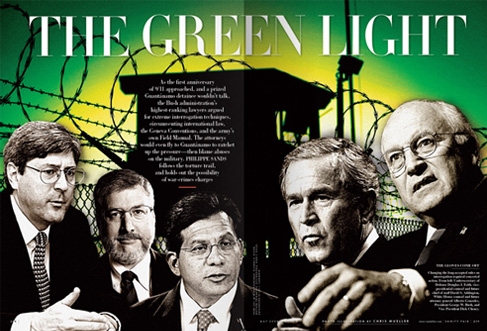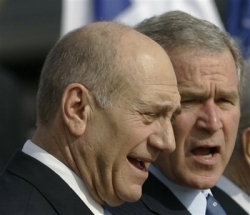Mr Bush and his “legacy”
By John Robertson, War in Context, April 6, 2008
According to Britain’s Daily Telegraph our war-hero “Decider” president has decided that he will pull no more troops out of Iraq. According to the report, which cites Pentagon sources, he feels that showing such “resolve” will cement his legacy – which, he obviously assumes, is going to be an honorable one that will burn his glorious presidency indelibly into the pages of our national memory. A major contributor to his decision, moreover, seems to have been a report from another of our war-hero stalwarts, Fred Kagan, American Enterprise Institute all-star and an “intellectual” godfather of the “Surge.” Kagan is also a frequent contributor to William Kristol’s Weekly Standard (required reading for the – one would have hoped by now – discredited neocon faithful), where right up to the recent Basra humiliation he was serving up self-congratulatory pieces about the success of the Surge and declaring Iraq’s civil war to be “over.” Sorry, Fred, but most of the real experts (people like Juan Cole, Nir Rosen, and Patrick Cockburn – that is, people who know the country intimately, have lived there, and can read its newspapers) who’ve been reading the tea leaves suggest that, in the inimitable words of an American showman whose name I can’t recall, we “ain’t see nuthin yet.”
Please forgive me if I sound callous or flip by putting it that way, but by now it ought to be clear that the unfortunate people of Iraq have a long road to travel – and probably many years of suffering ahead – before they will be able to enjoy an existence graced by any consistency of peace, prosperity, and security. Surge notwithstanding, the Sunni Arabs of Anbar and elsewhere are no closer to being included in the governing of the Iraqi state than they were during the proconsulship of L. Paul Bremer, who marginalized them from the outset of the American occupation. The much-touted Sunni sahwa (“Sunni Awakening”) – to which the Bush-Petraeus “Surge” owed so much of its putative success – now seems, at best, to be hitting its collective snooze alarm while the US tries to keep these new militias, which are completely outside the control of the central government, paid off. Despite its ongoing entreaties, the Bush administration has been unable to convince the Shia-dominated Maliki government to incorporate them into the Iraqi army. Nor is that government making any appreciable effort to find them jobs to divert their attention and secure them some livelihood, and paychecks. It is likely only a matter of time before they bug out altogether and turn their newly obtained arms, equipment, and training on the people against whom so many of them were originally most intent on fighting in the first place: the US occupation forces and their Shia Badr Force allies.
Meanwhile, the sun seems to be setting on the hope-filled halcyon days of the Kurds’ autonomy in Iraq’s northeast, in which they were able to bask only because (after years of being sheltered and nurtured under a US-enforced no-fly zone) they supported the US invasion right down the line, while the US could point to them as Iraq’s model of stability and potential. But now the US has shown itself all too willing to sell them out when a stronger, more potentially useful ally, Turkey, put its marker down in this new “great game.” Notwithstanding the protests of the Kurdistan Regional Government, Turkish forces only recently completed major incursions into Iraqi Kurdistan to go after the PKK; only days ago, for the umpteenth time, Turkish warplanes flew bombing sorties into the region; and the Turkish republic’s leaders have reserved the right to violate the sovereignty of the KRG (and, by the standards of anybody’s interpretation of international law, the sovereignty of the state of Iraq) when and if they deem it necessary (which, given the current turmoil in the Turkish government, also translates to “politically expedient”). And as if the threat from Turkey weren’t enough, the future stability of Kurdistan faces what is perhaps an even direr threat: the possibility of civil war among Kurds, Arabs, and Turks over the ultimate control of the city and region of Kirkuk.
And speaking of civil war, it’s pretty safe to say that the violence of late March in Basra and Baghdad was only a taste of what might be in store for Iraq’s largely Shia south and center, where the scions of the powerful and prestigious al-Hakim and al-Sadr clerical lineages (along with smaller groups like the Fadhila party in Basra) are vying for political control (and in Basra, control of Iraq’s vital oil exports) as provincial elections, scheduled for October, approach. Their respective leaders – Abdulaziz al-Hakim and Muqtada al-Sadr – control well-armed and inspired militias (respectively, the Badr Forces and the Jaish al-Mahdi, or “Mahdi Army”) that fought each other viciously in the holy city of Karbala only a few months ago, and in Basra and Baghdad only recently. Thanks largely to the intervention of Iran (which was spearheaded by a “terrorist” Revolutionary Guard general), Muqtada agreed to a truce, not to be mistaken for a peace treaty. Simply put, the two militias hate each other. Add then to this very combustible mix that Muqtada is the leader of a huge popular political movement that claims the support of hundreds of thousands of the poor Shia of teeming slums like Sadr City in Baghdad, and of hundreds of thousands more in Iraq’s second largest city, Basra. He has called upon his followers – and other Iraqis who want the US occupation out of Iraq – to come together next week for a million-man march. That march was originally set for the holy city of Najaf, a stronghold of the Islamic Supreme Council of Iraq (ISCI), the Shia political movement led by Abdulaziz al-Hakim. Now, however, Muqtada has decided to stage the march in Baghdad.
Keeping a lid on the tensions that will be bubbling in Baghdad next week will be the job of the Maliki “government.” This is, of course, the same Maliki government that was recently humbled by its failure in Basra and that appears ever more dysfunctional, hunkered down in the “Green Zone” (beyond which it exercises little real control) and confronted with a divided, often absentee parliament. The army Maliki commands has proved itself largely unreliable and ineffective, often including members of the Badr militia whose loyalties to the state are suspect or forced to rely on Kurdish peshmerga who are loath to be involved in inter-Arab conflicts. But it’s this army with which Maliki is entrusted with keeping a damper on the situation as Muqtada’s march approaches. Can we really believe they’re up to it?
No. Which is why US troops, air power, and special forces will be on the scene aplenty next week – and why, Mr. Bush has now decided, and why Gen. Petraeus will insist next week, they will need to be there for the foreseeable future. And it’s also why Mr. Bush will feel it justifiable and necessary to hand off the Iraq tinderbox to his successor. Given the current mood of US citizenry (of whom, a new poll indicates, more than 80 percent believe that the country is headed in the wrong direction), that successor will likely not be a member of Mr. Bush’s political party. But with a level of military effort no longer sustainable (as almost all of the top brass have insisted), and with the national economy swirling the bowl, that successor will most certainly have to begin to disengage the US from Iraq – and be left to hold the bag for the hubris, incompetence, and catastrophe of his predecessor.
Because, as US forces pull out, Iraq will most certainly fall apart even more, its misery and violence ratcheting up by several notches. With much more justification than Mr. Bush did last week, many across the world will proclaim it a “defining moment.” Some will proclaim that the American behemoth has been vanquished once and for all. Others, perhaps more reflectively, and dishearteningly, may surmise that whatever fires America might have lit for insisting on goodness and justice on the planet lie in cinders, if not altogether doused.
But Mr. Bush’s glorious page in our national memory will be completely up in smoke, wisps on the wind of history.
John Robertson is a professor of Middle East history at Central Michigan University and has his own blog, Chippshots.


 In terms which appeared to defy earlier sharp criticism by the US Secretary of State, Condoleezza Rice, Mr Olmert made it clear in front of President George Bush that he regarded such expansion as outside the “moratorium” he has promised on new settlement building. His declaration came as the US President, on his first visit in office to Israel, used some of his strongest language yet in demanding the dismantling of separate settlement outposts which are illegal even under Israeli law. Mr Bush said at a joint news conference last night: “We have been talking about it for four years – illegal outposts. They ought to go.”
In terms which appeared to defy earlier sharp criticism by the US Secretary of State, Condoleezza Rice, Mr Olmert made it clear in front of President George Bush that he regarded such expansion as outside the “moratorium” he has promised on new settlement building. His declaration came as the US President, on his first visit in office to Israel, used some of his strongest language yet in demanding the dismantling of separate settlement outposts which are illegal even under Israeli law. Mr Bush said at a joint news conference last night: “We have been talking about it for four years – illegal outposts. They ought to go.”